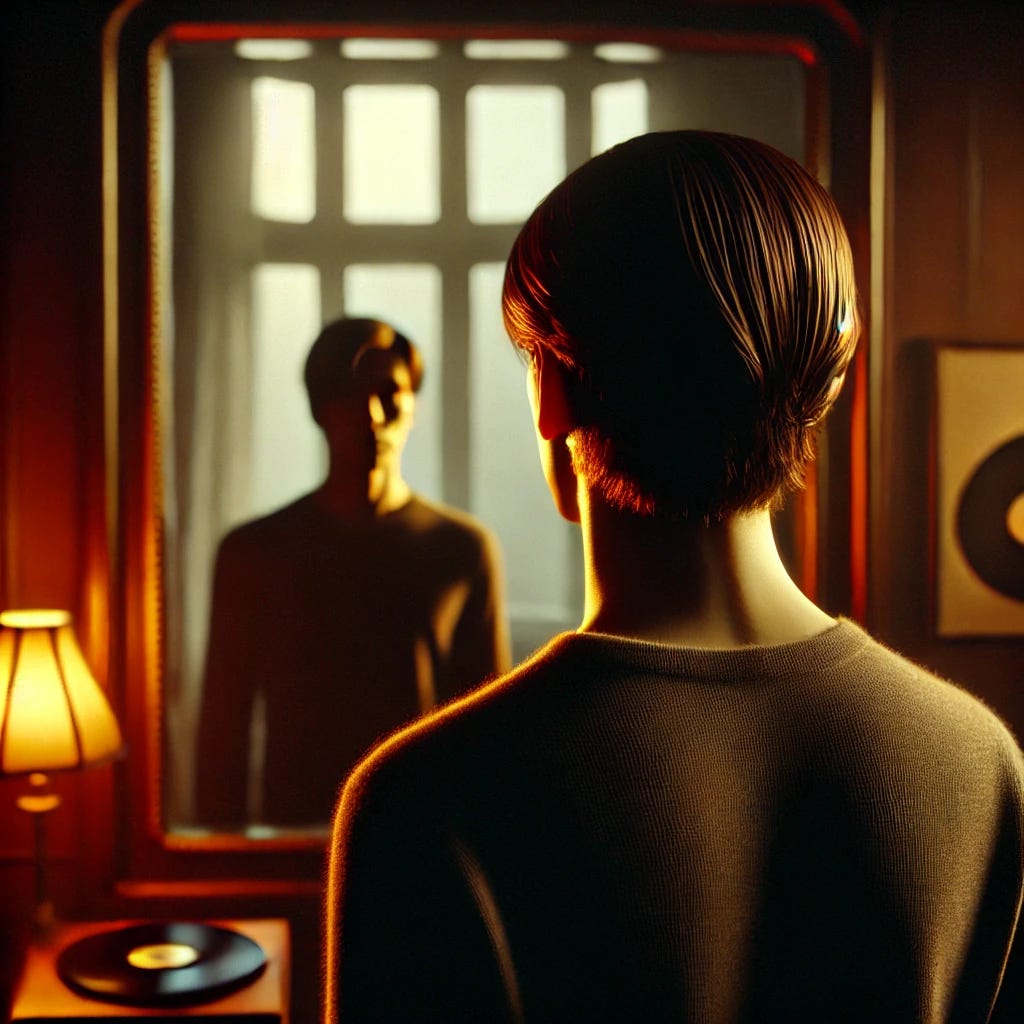A Real Rival in Myself
What Wilco taught me about self-mastery, internal conflict, and starting over—again
"I myself have found a real rival in myself…"
—Wilco, “Pot Kettle Black”
Some songs feel like they've always known you. Wilco’s Pot Kettle Black is one of those rare tracks that, even in its musical complexity and lyrical ambiguity, speaks with startling intimacy. I loved it in university. I love it now with an enriched understanding of why—not for entirely different reasons, but because my thinking has matured and deepened my experience of the original ones.
This is an essay about a song—but it’s also about something more persistent: the internal divide between who we are and who we aim to become. Recognizing that conflict is not defeat. It’s the beginning of integration.
Words Without a Song
Crazy rides rockets / Waves a magic wand / Empty out your pockets / Words without a song
We all gather experiences. We fill our pockets with moments, insights, heartbreaks, and epiphanies—but many never become anything more. If they aren’t integrated into a coherent worldview, if they don’t become part of a song, they remain just… words. Like scattered puzzle pieces with no box cover to show us what we’re building.
That’s where many find themselves stuck. We’ve lived, we’ve felt, but for all our experience, we are not more sophisticated. We haven’t learned how to synthesize it. And so we default to drifting—mistaking motion for direction. Mistaking experience for wisdom.
The Eternal Internal Rival
I myself have found a real rival in myself / I am hoping for the re-arrival of my health
This lyric hit me when I was younger—and only recently have I come to grasp its full gravity. Because we all know it’s not "them" keeping us from what we want. It’s us.
But this isn’t some tired trope about self-sabotage. It’s a philosophical reckoning. When I discovered Ayn Rand’s formulation that the moral is the practical, something clicked. Rational selfishness isn't hedonism. It’s not a frantic grab at what feels good, but a thoughtful, often difficult pursuit of what is actually good for oneself. It demands the clarity to distinguish genuine values from momentary impulses. And that pursuit requires honesty, thought, and the courage to resist seductive short-term escapes.
The "rival" in ourselves is not some demonic alter ego. It’s the part of us that resists clarity. That prefers distraction over reflection, emotional comfort over purposeful change. Real health—of body and soul—requires confronting this rival, not with shame, but with rational integration.
That lyric—"hoping for the re-arrival of my health"—has come to echo more deeply over time. It evokes not just a physical return, but a moral and psychological realignment. In contrast to the passive hoping of Subjective Optimism, true health won’t just return on its own. It must be pursued. The rival doesn’t disappear. But he can be outthought, outplanned, outmaneuvered.
You Are So Oblivious… to Yourself
It's become so obvious / You are so oblivious to yourself
One of the most biting and accurate insights into modern consciousness. We’re so outwardly fixated—on trends, politics, other people’s opinions—that we lose sight of the interior. Not in the vague, mystical sense, but in the concrete, cognitive sense: What do I know? What do I want? Why do I want it?
To be oblivious to oneself is to live unchosen. To default. To drift. And in my framework of Objective Optimism, that’s the cardinal sin. Not just because it’s ineffective—but because it’s immoral. The ineffective is the immoral, when morality is rightly understood as the pursuit of what is objectively good for one’s life. Drifting through unawareness will never lead to flourishing.
The person you pretend not to be aware of is still steering your life.
The Pot, the Kettle, and the Courage to Stop Projecting
You're tied in a knot / But I'm not gonna get caught / Calling a pot kettle black
It’s easy to recognize other people’s inconsistencies. It’s a bit harder to spot our own. Tweedy’s line isn’t just an indictment of projection; it’s a commitment to refusal. A decision not to externalize what is essentially internal. A promise not to engage in reciprocal hypocrisy, but to hold the mirror up first.
That’s the essence of growth: recognizing that the project is me. Not them. Not the world. Me.
Mastering the Rival
Every song’s a comeback / Every moment’s a little bit later
There’s something powerful about thinking of that part of you—the lazy part, the fearful part, the avoidant, the perfectionist, the chronic overthinker—as a rival. Not a demon. Not an enemy. A rival. Someone close. Someone who knows you. Someone who isn’t going anywhere.
That rival is going to be with me my whole life. So I’d do best to study him. Understand him. Learn how to master him—not through brute force or denial, but through recognition. Through clarity. Through structure and compassion and a relentless recommitment to my values.
He’s won a few battles. And he’ll win again. Sometimes I’ve let a losing streak drag on longer than it should have. But every day offers a chance to flip the script. Every song’s a comeback. Every moment’s a little bit later. Every action is a note. I can start a new winning streak whenever I’m ready.
A Final Note: I’m Not Preaching—I'm Practicing
Look—I know all this mainly through introspection. Through repeated failures, repeated recoveries. So I’m not here to prescribe how you should live. This blog isn’t about shaming or blaming. It’s not even advice, really.
It’s an ongoing attempt to put words to a process I’m still refining. It’s me documenting what’s helped, what I’m learning, what I observe in human nature—and how I might better that eternal rival who is myself.
If any of this proves helpful to you—if it echoes something you’ve felt but hadn’t quite named—then I’m sincerely glad. I’m very pleased for you to help yourself. Take what serves you. Leave the rest.
But above all, know this: I’m certainly not gonna get caught calling a pot kettle black.
(—Now don’t you get caught missing more Mr. Bright Side.)



